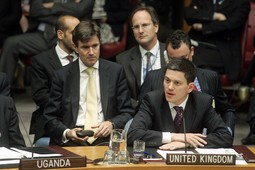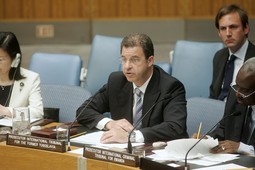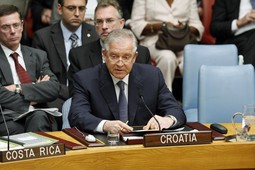THE BRITISH DEMAND ARRESTS Britain's permanent representative to the UN John Sawers, the representative to the Security Council Philip Parham and the head of the diplomacy David MilibandThe Croatian authorities will, by all accounts, launch criminal proceedings in the coming days against persons who are alleged to have taken Operation Storm artillery logs sought by the Hague tribunal's prosecution. Z. H. and B. M., persons whose full names are known to Nacional, admitted in questioning by the police that they took a part of the artillery logs and described the circumstances under which this took place, and are likely to come under the scrutiny of the Croatian authorities.
The Croatian authorities will launch proceedings against these two persons partly because this was demanded by Philip Parham, the British representative to the UN Security Council. Launching these proceedings could help in unblocking Croatia on its way to EU membership. Delaying Croatia in its accession to the EU would probably suit British policymakers, who have for years used the Gotovina case as a means of blackmail and inappropriate pressure, abetted by the manipulation of some Croatian periodicals. The Globus weekly and the Jutarnji list daily ran articles these days that point to a conclusion that Ante Gotovina personally ordered the elimination of the allegedly crucial artillery logs in order to better his position before the Hague tribunal. It is not true that the controversial artillery logs were destroyed to assist Gotovina in the Hague, nor that Government accused Gotovina of doing so on any one of the 527 pages of the report on the search for the artillery logs it sent to the Hague tribunal on 29 April. The first statement was given by Z. H., a close wartime associate of Ante Gotovina's. The competent Croatian institutions spoke with him on several occasions. First on 24 November 2008 and then on 5 and 10 March of this year. Each time, Z. H. was questioned by the police for at least five hours.
His last interview with the police, however, was reduced to an official note of just two and a half pages, which led him to suspect that his statements had been wrongly interpreted. Z. H. stated that he took some copies of documents called artillery logs from the military archives of the Knin Military District that Ante Gotovina needed to write his book Croatian Army and Croatian Defence Council Battle Assaults and Operations, the first edition of which was published in 1996. The book was written by Gotovina as a textbook for those attending the Croatian Military Academy's Staff Command School. At the time Gotovina was serving at the post of Chief Armed Forces Inspector, while Z. H. worked at the Chief Inspectorate. Z. H. said that Ante Gotovina liaised with Staff Brigadier Mirko Sundov, then Commander of the Knin Military District, in obtaining the maps.
These maps were drafted after Operation Storm for Gotovina's book, and were based on written commands that are very likely available to the Hague prosecutors. Z. H. picked up seven archive maps and signed a receipt to that effect, and Gotovina drafted a list of maps and documents he required. Z. H. has told the police that not one of these documents had any particular importance as they pertained to logistics, the maintenance of facilities and the like, that he submitted them all to Gotovina in Zagreb and that the documents were then scanned. And while the official note reads that Z. H. presumed that these documents were to have been brought because it had already been rumoured that the Hague tribunal was looking for certain documentation, and that General Gotovina knew what documentation was at issue, Z. H. insists that he told the police nothing of the kind, not even in the form of an assumption. That is why Z. H. on June 3rd notarised a statement at the office of Zagreb notary public Janko Zitak in which he responded to the content of the official notes. In the statement he says that he has no recollection of ever telling the police that Gotovina had requested the documents because of the Hague tribunal or that the same had been his assumption at the time.
Hague prosecutor Serge Brammertz insists on the artillery logsWhat is more, it can be established from the receipt he signed on 7 April 2000 in Knin when assuming possession of the controversial maps, and from the documents of the same date bearing the title "Artillery Maps in Assault Operations, Minutes ", signed by Mirko Sundov and Zivko Cikotic, the Captain who turned the controversial maps over to him, that these documents were issued on the basis of a verbal request from Staff Brigadier Marko Rajcic, and not from Ante Gotovina. Z. H. also said that he knew that some of the maps published in the first edition of the book did not agree with commands issued during Operation Storm. In his words, that would explain the fact that the verbal order was issued by Marko Rajcic, who was the assistant to the artillery commander during Operation Storm. Z. H. says that he turned all of the documents over to the Defence Ministry Chief Inspectorate when he returned to Zagreb, and not to Ante Gotovina. He says that he was shown official notes of the police questioning of Marko Rajcic of 11 July 2008 in which it says that Rajcic saw the maps with this documentation in the office of General Gotovina in 2001. He says that it is possible that these were in fact the same maps he brought from Knin, and that in 2001 it was no longer the office of General Gotovina, as he had been retired from the service in the autumn of 2000.
If Z. H. has in fact told the truth, then his statements show that the proposition that Gotovina ordered the elimination of the controversial artillery logs emerged on the basis of an imprecise official note signed by police officer Zoran Melkic. Key testimony was also given by B. M., the artillery commander of what was then the Croatian Defence Council Kralj Tomislav Brigade. After the Washington Agreement was signed the brigade was restructured and operated jointly with Croatian Armed Forces during military operations on the territory of Bosnia & Herzegovina in 1994 and 1995. He stated that a day ahead of Operation Storm he personally and members of the command HQ, with the direct assistance and participation of Marko Rajcic, drafted battle documentation for forces in the field. B. M. left the Croatian Defence Council in March of 1996 upon his appointment to the post of Chief of the Tomislavgrad Police Department. At the time he took a large quantity of wartime documentation, including that from Operation Storm. B. M. has stated that he took the documents because he wished to protect them from destruction or misuse, and that it had been his intention to later turn them over to Croatian authorities, but that he entirely destroyed them in late December of 2000. This happened after a major operation carried out in Bosnia & Herzegovina by representatives of the international community, when they dismissed all of the Croatians serving at leading functions in the Herceg Bosna administration. B. M. stated that he destroyed the documents in fear that the Hague tribunal would misuse them. It was his personal decision, not influenced by anybody else, least of all Ante Gotovina.
Gotovina has the allegedly controversial documents in his possession to this day, and his defence team is ready to submit them to the Hague tribunal's prosecution immediately if they so request. Government has furthermore stated its position that the unauthorised removal and destruction of the documents was caused by various reasons, including the inexperience and unprofessional comportment of some Croatian Army commanders. Government has told chief Hague prosecutor Serge Brammertz that the requested documents could not serve in proving war crimes, because all commands had an obligatory clause concerning the respect of war conventions and the protection of civilians. The Hague prosecution broached the issue of the artillery logs on 13 June 2008 when it demanded that Croatia be issued a mandatory order to deliver the documents. The request came only a week after the end of cross-examination of the last witness for the prosecution, General Alain Forand, the last in a series of witnesses that were to have testified of the excessive shelling of Knin, but whose testimony did not meet the prosecution's expectations. Sources close to General Gotovina's defence team say that the Hague tribunal prosecution started seeking the allegedly key documents at an unusual time - the trial was already under way, all of their witnesses have given testimony, and then someone in the prosecution came to the conclusion that they lacked key elements to prove the allegations in the indictment.
THE INITIATIVE SPEARHEADED BY PRIME MINISTER Ivo Sanader in New York aims to improve the poor relations between Croatia and the Hague tribunalLate last year Government and the attorneys representing Ante Gotovina received a request for 156 documents the prosecution was missing, even though 73 of these documents where already in their possession. The list was subsequently reduced to some twenty artillery logs. Furthermore, in an article headlined "Government Confirms: Gotovina Took The Logs" published in the last issue of the Globus weekly, there is a copy of a assault operation command issued by Gotovina and a map that Gotovina's defence team legally acquired from the Defence Ministry, to which official notes testify. The possibility has not been excluded that some artillery logs were taken from the Defence Ministry archives by British spies working with the Hague prosecution, who had unimpeded access to this archival material for years. It is possible that they have them in their possession to this day, that they know that their real significance for the trial is not great, but that they are hiding them to create the groundwork for new manipulations with which to further delay Croatia on the road to the EU. If Gotovina is depicted as a thief who stole documents that could be key to the Hague prosecution in the trial, then the Hague prosecution's position in the process might be improved. It all points to a rising anxiety among Hague prosecutors as the trial nears its end.
An indictment without key evidence
The Hague prosecution began insisting on the artillery logs after the testimony given by General Alain Forand on 13 June 2008. Forand was the last of the witnesses whose testimony was to have corroborated the allegations of the excessive shelling of Knin, but his testimony did not fulfil the prosecutor's expectations. That is why there is an impression that the artillery logs would provide the prosecutor with the key evidence without which the indictment would be dismissed.






